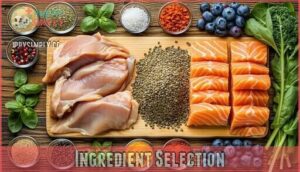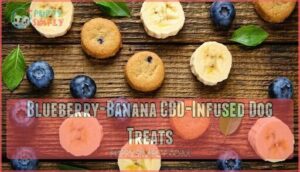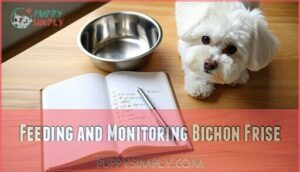This site is supported by our readers. We may earn a commission, at no cost to you, if you purchase through links.

Your Bichon’s small size means portion control is key, and you’ll want to balance nutrients for shiny coats and wagging tails.
Homemade options can cut down on allergies and tummy troubles, and you get to skip the mystery ingredients.
Just don’t forget a sprinkle of calcium for strong bones. Cooking for your pup’s like preparing Sunday dinner—love and science mixed together.
Curious about tasty recipes and feeding tips? Stay tuned.
Table Of Contents
Key Takeaways
- You control every ingredient, so you can avoid allergens and ensure your Bichon gets lean protein, healthy fats, and fresh veggies.
- Portion control is crucial—Bichons are small, so measure meals and monitor their weight to prevent obesity.
- Homemade meals can improve digestion and reduce allergies compared to commercial foods with fillers and preservatives.
- Always balance nutrients, especially calcium and omega-3s, and check with your vet to keep your dog’s diet safe and complete.
Bichon Frise Nutrition Needs
Your Bichon Frise needs a carefully balanced diet with high-quality proteins, healthy fats, and essential nutrients to maintain their fluffy coat and energetic personality.
A balanced diet keeps your Bichon’s coat fluffy and their energy shining every single day.
Understanding their specific nutritional requirements helps you create homemade meals that support their small size, active lifestyle, and potential sensitivities, which is crucial for maintaining their overall health and energetic personality.
Balanced Diet Importance
When you’re crafting a bichon frise diet, balanced nutrition becomes your dog’s foundation for lifelong health.
Proper nutrient ratios prevent deficiencies that can shorten your pup’s lifespan by 1-2 years.
Essential balance elements include:
- Protein (30-35%) for muscle maintenance and energy
- Healthy fats (15-20%) supporting coat shine and brain function
- Carbohydrates (45-55%) providing sustained energy for daily activities.
Homemade dog food requires careful ingredient variety and recipe adjustments.
Health monitoring helps you spot imbalances early, while portion control prevents obesity affecting over half of companion dogs.
Protein Requirements
Your Bichon Frise needs 18-25% protein in their daily diet, with puppies requiring 22-28% for proper growth.
High-quality protein sources like chicken, turkey, and fish provide essential amino acids for muscle development.
Digestibility factors matter—cooked meats absorb better than processed kibble.
Watch for deficiency symptoms like poor coat quality, while avoiding overconsumption risks that stress kidneys.
For ideal growth, make certain the food meets AAFCO standards.
Healthy Fats and Carbohydrates
After securing quality protein sources, you’ll need to balance healthy oils and complex carbohydrates for ideal bichon nutrition.
Omega-3 sources like salmon oil support coat health, while chicken fat aids fat digestion.
Complex carbohydrates from sweet potatoes and brown rice provide steady energy, creating balanced dog diet foundations for your homemade recipes with healthy oils.
Essential Vitamins and Minerals
Your bichon’s immune system depends on the right vitamin and mineral cocktail to stay healthy and energetic.
Homemade diets need careful planning to avoid nutritional gaps that can harm your furry friend’s wellbeing.
- Vitamin A: Supports immune response and coat health; deficiency causes night blindness in bichons
- Calcium Sources: Maintain 1.2:1 calcium-to-phosphorus ratio for strong bones and teeth development
- Omega-3s: Essential for skin health and reducing inflammation in small breeds
- Mineral Ratios: Balance zinc and selenium carefully to prevent immune suppression or toxicity
Homemade Dog Food Benefits
Making homemade dog food for your Bichon Frise gives you complete control over what goes into their bowl, letting you tailor meals to their specific needs while avoiding artificial preservatives and fillers.
You’ll often save money compared to premium commercial foods while potentially reducing digestive issues and food allergies that can plague this sensitive breed, which is a significant advantage of homemade dog food, providing a potential solution to common health issues in Bichon Frises.
Customization Options
You’ll love having complete control over what goes into your Bichon’s bowl.
Ingredient Swaps let you substitute chicken for turkey based on your pup’s preferences, while Recipe Variations accommodate different protein sources.
Supplement Choices allow you to add omega-3s or probiotics as needed.
Texture Preferences mean you can adjust consistency for picky eaters.
Allergy Adjustments help eliminate problematic ingredients completely, ensuring your pup’s diet is tailored to their specific needs with Supplement Choices.
Cost-Effective Alternative
Making your own dog food recipes can slash your pet food budget substantially.
Smart ingredient sourcing and bulk buying strategies help you stretch every dollar while maintaining quality nutrition for your Bichon Frise.
Here are four ways homemade dog food saves money:
- Bulk buying ingredients – Purchase chicken, rice, and vegetables in larger quantities to reduce per-pound costs
- Recipe optimization – Create larger batches that freeze well, maximizing your time and ingredient efficiency
- Waste reduction – Use every part of ingredients and repurpose leftovers into nutritious meals
- Long-term savings – DIY dog food costs 30-50% less than premium commercial brands over time
Improved Digestion
Digestive harmony becomes achievable when you control every ingredient entering your Bichon’s system.
Homemade meals eliminate mystery additives that trigger food sensitivities, while fresh fiber sources from vegetables promote healthy gut bacteria.
You’ll notice improved stool consistency and reduced gas as your sensitive stomach diet takes effect, supporting ideal dog digestion through careful bichon frise care and maintaining digestive harmony.
Reduced Allergies
Food allergies affect up to 10% of dogs, making ingredient control vital for your Bichon’s wellbeing.
Homemade meals let you practice ingredient elimination, removing common triggers that cause allergy symptoms. You’re basically becoming your pup’s personal detective, identifying what works for their unique immune system.
Benefits include:
- Enhanced skin health through controlled ingredients
- Improved gut microbiome balance
- Reduced exposure to commercial preservatives and fillers
This approach creates hypoallergenic dog food specifically formulated for your sensitive stomach diet needs, supporting your Bichon’s limited ingredient diet requirements through carefully crafted homemade dog food recipes.
Creating Homemade Dog Food
Making homemade dog food for your Bichon Frise gives you complete control over ingredients and nutritional balance.
You’ll create meals that match your pup’s specific dietary needs while avoiding common allergens and preservatives found in commercial foods, which allows for a balanced approach to your dog’s diet.
Recipe Development
Developing homemade dog recipes requires careful planning and systematic testing.
Start with basic ingredient ratios: 50% protein, 25% vegetables, and 25% grains.
Recipe testing involves preparing small batches first, observing your Bichon’s response over several days, and making dietary adjustments based on their energy levels and digestion.
Experiment with flavor enhancements like bone broth or texture variations through different cooking methods to create appealing, nutritious meals.
Ingredient Selection
Quality ingredients form the foundation of healthy bichon food. Choose organic sources for protein variety like chicken, turkey, or fish to support your bichon frise’s nutritional needs.
Consider grain alternatives such as sweet potatoes or quinoa for sensitive stomachs. Add superfood additions like blueberries and spinach for antioxidants.
Always review allergy considerations when selecting dog food ingredients to guarantee maximal dog nutrition for your pet. A balanced diet should consider the protein-to-fat ratio for ideal health.
Cooking and Storage Methods
Once you’ve selected your ingredients, proper cooking and storage become your recipe’s foundation for success.
Safe cooking methods preserve nutrients while extending shelf life, keeping your Bichon healthy and satisfied.
Follow these dog food preparation tips for ideal results:
- Roasting Techniques: Cook chicken at 450°F until internal temperature reaches 165°F, ensuring safe elimination of harmful bacteria
- Portioning Meals: Divide prepared food into individual serving sizes using freezer-safe containers for convenient daily feeding
- Freezing Guidelines: Store portions for up to three months in freezer, with seven-day shelf life when refrigerated for optimal freshness
Safe thawing requires overnight refrigeration rather than countertop methods. Consider using containers designed for freezing to maintain food quality.
This homemade dog food safety approach prevents bacterial growth while maintaining nutritional value. Your preparation efforts will reward you with tail-wagging enthusiasm at every mealtime.
Nutrient Balance and Supplements
Balance becomes your safety net when creating homemade meals.
Adult Bichon Frises need careful attention to calcium needs and mineral deficiencies that plague many homemade diets.
Omega sources like fish oil support coat health, while vitamin overdose risks lurk with excessive supplementation.
Many owners find quality supplement options helpful for their Bichons.
Always secure vet approval before adding supplements to guarantee proper nutritional balance in your pet nutrition plan.
Bichon Frise Homemade Recipes
You’ll love these four homemade recipes designed specifically for your Bichon Frise’s needs. Each recipe provides balanced nutrition while being gentle on sensitive stomachs common in this breed.
Chicken and Rice Delight
This chicken and rice recipe forms the foundation of homemade dog food for your Bichon Frise. You’ll combine lean chicken breast with brown rice, creating a digestible meal rich in protein and carbohydrates.
Recipe Variations include adding sweet potatoes or carrots for extra nutrients. Ingredient Quality matters—choose organic chicken when possible.
Simple Cooking Methods involve boiling chicken and rice separately, then mixing together. This combination supports ideal pet nutrition while providing excellent Health Benefits for your dog’s digestive system.
Many owners also find success with a chicken rice dog diet, which can be a key part of a complete and balanced diet, offering extra nutrients and supporting ideal pet nutrition.
Turkey, Vegetable, and Quinoa Feast
This turkey-based recipe provides excellent protein variety for your bichon feeding guide needs. Ground turkey offers lean protein while quinoa delivers complete amino acids and fiber.
Recipe Variations include sweet potato or butternut squash substitutions. Quinoa Benefits include digestibility and essential nutrients for canine nutrition.
Use organic Ingredient Sourcing when possible. Practice Portion Control by measuring ingredients precisely.
Storage Tips: refrigerate homemade dog food for three days or freeze individual portions. Cook turkey thoroughly, steam vegetables until tender, and combine with cooked quinoa for ideal nutrition.
Beefy and Veggie Medley
For busy pet parents looking to mix things up, this beefy and veggie medley offers the perfect balance of protein and plant nutrients.
Ground beef provides essential amino acids while carrots, sweet potatoes, and green beans deliver fiber and antioxidants.
When selecting beef sourcing, choose lean 85/15 ground beef for ideal canine nutrition.
Recipe variations can include different cooking methods like slow-cooking or steaming vegetables.
Portion sizes should match your bichon feeding guide recommendations for this healthy dog recipe addition.
Blueberry-Banana CBD-Infused Dog Treats
These special treats combine Blueberry Power and Banana Benefits for bichon health.
Mix one cup oats, half cup each fruit, and food-grade CBD oil following proper CBD Dosage guidelines (0.1-0.2mg per kg body weight).
Treat Baking at 325°F preserves nutrients.
For ideal canine health, consider vet approved recipes.
Storage Tips: use airtight containers for optimal freshness in your canine culinary adventures.
Feeding and Monitoring Bichon Frise
You’ll need to track your Bichon Frise’s meals and watch for any changes in weight, energy, or digestion, since small breeds can be sensitive to dietary shifts.
It’s smart to keep a notebook handy—sometimes a little detective work is needed when your pup starts acting like a picky food critic, and this can help identify any issues related to their diet.
Calorie Requirements and Feeding Schedule
Your adult Bichon typically needs 325-650 calories daily based on weight and activity level. Puppies require up to 50 calories per pound for growth, while seniors need 20% fewer calories.
Here’s your feeding framework for ideal bichon health:
- Feeding Frequency: Serve 2-3 meals daily for adults, 3-4 for puppies to stabilize energy and support proper canine dietary requirements
- Portion Control: Measure ½ to 1 cup per meal using scales for accuracy, following veterinary advice on calorie calculation
- Senior Adjustments: Reduce portions by 20% for less active older dogs while maintaining their dog nutrition guide schedule
Monitoring Health and Adjusting Diet
Watch your Bichon Frise closely for signs their homemade diet is working well.
Monitor weight management by checking their body condition weekly – you should feel ribs easily without excess padding.
Track stool consistency, energy levels, and coat condition daily.
Notice any allergy monitoring needs through skin irritation or digestive upset, and adjust portions and ingredients based on these canine health indicators to meet your pet’s specific dietary requirements.
Consultation With Veterinarian
Before switching your Bichon Frise to homemade food, you’ll need veterinary guidance.
Your vet will evaluate your dog’s health, recommend dietary adjustments, and approve recipes to prevent nutritional deficiencies.
They’ll provide supplement guidance and monitor for toxicity awareness issues.
Regular health monitoring guarantees your canine diet meets all requirements, as up to 95% of home-prepared foods lack proper nutrition without professional oversight.
It’s also vital to know that grapes can be toxic to Bichons, highlighting the importance of professional oversight.
Transitioning to Homemade Dog Food
After talking with your vet, it’s wise to start with a Gradual Introduction.
Mix a bit of homemade dog food with your pup’s usual meal, watching for Texture Preferences and Food Allergies.
Keep an eye on Hydration Needs, and use Portion Control for dog dietary health.
Homemade dog food benefits and dog food alternatives offer great dog nutrition tips for a balanced homemade dog diet.
Frequently Asked Questions (FAQs)
What is the best diet for a Bichon Frise?
You’ll want a balanced diet with lean meats, brown rice, veggies, and healthy fats.
Avoid onions and garlic.
Supplement calcium and omega-3s.
Always check with your vet, since every dog’s tummy has its own quirks!
What are the best ingredients to use in homemade dog food?
You’ll get the best results using lean meats like chicken or turkey, brown rice, carrots, pumpkin, and ground flaxseed.
Toss in eggs for protein and calcium.
Skip onions, garlic, and chocolate—those are canine no-nos!
Can homemade food help with tear staining?
About 60% of dogs with tear stains improve when you cut out processed foods.
You’ll see cleaner fur if you use lean meats, fresh veggies, and avoid fillers.
It’s like swapping junk food for a salad—results show.
Is homemade food suitable for bichon puppies?
You can feed homemade food to puppies if you balance nutrients carefully, use lean meats, and avoid toxic ingredients.
Always check with your vet, since growing pups need extra calcium and vitamins for healthy bones and development.
How to prevent picky eating with homemade meals?
Ever tried convincing a toddler to eat broccoli?
Rotate ingredients, keep meals varied, and don’t fuss if your pup skips a meal.
Consistent routines, gentle encouragement, and mixing in favorite flavors help keep picky eating at bay.
What foods should be avoided for bichon frise?
Steer clear of onions, garlic, chocolate, grapes, and raisins—they’re toxic for your pup.
High-fat meats, spicy foods, and bones can cause trouble too.
Think of their tummy as picky as a toddler’s lunchbox!
Conclusion
Picture your Bichon Frise enthusiastically waiting by the kitchen as you prepare homemade dog food packed with lean protein, fresh veggies, and healthy fats.
With these balanced recipes, you’re giving your pup nutrition that supports a shiny coat and happy tail.
Portion control and calcium keep bones strong, while customizing meals can help with allergies.
Remember, always monitor health and adjust as needed, providing your Bichon Frise with care, science, and love combined, making homemade dog food a complete and loving experience.

















